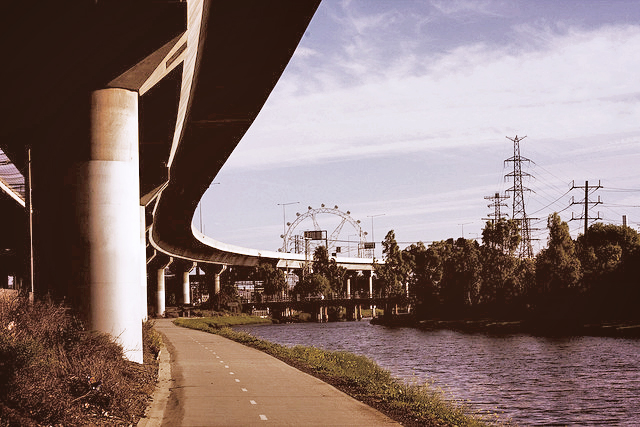Aubrey Hirsh
The first time his knee goes out he ignores it. It happens during a handball game with fellow astronaut Frank Borman. When Frank says, “You really dove for that one,” Michael nods. He peels himself from the gym floor carefully, testing his knee. It seems okay for now, but he knows in his skin that something is wrong.
He doesn’t make an appointment with the doctor until his wife, Pat, finds him on the stairs. He isn’t crying, he’s just quietly planted on the eighth stair from the bottom, seventh stair from the top. He’s counted them over and over again, along with the buttons on his shirt, the stripes on his socks, and the tiny stitches on his inseams. When Pat appears at the bottom of the stairs she gives him a puzzled look. He says, “My legs won’t work,” and they call the doctor together.
As soon as the doctor says “surgery,” Michael knows he won’t be flying his next mission. He won’t be the module commander for Apollo 8. He won’t be the first man to orbit the moon. When he tells Pat, she tries her best to look sad, but he knows that she’s celebrating inside. She’d rather have him face down on a table, back open like a big top tent, a stranger’s hands on his spine, than have him in the shuttle with his team, eyes open, mind sharp.
James Lovell goes in his place. He circles the moon four times and comes back to Earth with stories no one has ever heard before. While he tells them, Michael heals. He focuses on his damaged vertebrae, fusing them together with his mind. He thinks about his back brace, that horrible restrictive cage, as injecting his bones with steel. He can feel himself getting stronger.
NASA announces Apollo 11 and he sketches a cartoon bald eagle landing on the moon’s surface, the Earth rising like a star in the background. The crew list goes up and he is on it, along with Neil and Buzz. Of the three of them, Michael has the most EVAs. Neil, the most experience as command pilot. Michael can feel goosebumps popping up over the scar on his back. He is going to be the first man to walk on the moon.
At home, he rinses off the dinner dishes and tucks the kids into their beds as if none of this is happening. He does not spend hours gazing at the moon, as he’s sure everyone imagines. He doesn’t even look at it. He keeps his head down, focuses on the complicated sequences of throttles and thrusters, how long it takes him to get in and out of his spacesuit, and keeping his stomach still during aerobatics.
When they tell him he’ll be the command pilot, that he won’t even board the lunar module, he doesn’t cry. He tells Pat late in the evening, after the kids have gone to bed and she, once again, channels all of her giddy energy into conjuring sad eyes for a long moment. Whether this makes him love her or hate her, he doesn’t know. For now, he can only feel this one feeling.
While Neil and Buzz make their small steps and take communion on the lunar surface, Michael orbits the moon twenty-one times. Every time he spins around the dark side, he loses radio contact with Kennedy for forty-eight minutes. For forty-eight minutes out of every two hours he is completely, utterly alone. During those precious minutes, he makes several important discoveries that he doesn’t call in to Kennedy. First, he realizes that if his father hadn’t dragged him all over the globe when he was a boy, he wouldn’t be orbiting the moon right now. He, his mother, and his little leather suitcase chased his father from country to country for decades. Now that his father is dead, Michael isn’t sure if he’s still chasing him or if, finally, he is running away.
Second, he discovers that he doesn’t want to fly anymore. He’s been offered a spot on the back-up crew for Apollo 14, but he won’t take it. All the big leaps forward have already been taken, all the new territory discovered. He’s tired of the scared looks in Pat’s eyes. He feels his body move through every orbit and he knows that when he returns to Earth, it will be for good.
Finally, as he rockets once again into the deep blackness of space, for his last forty-eight minutes of ear-ringing silence, he knows that this will be his legacy. No one on Earth has ever been as alone as he has. Even Adam had Eve. Even Jesus, when he was writhing in pain on the cross, shouted words that people could hear. Maybe, in the beginning, The Creator felt this loneliness. Maybe that’s the only reason anyone exists. Michael thinks about all the things he could say in his last twelve minutes of perfect solitude that no one would ever hear.
In the end, he chooses to say nothing. He remains quiet until he comes into radio range, his intercom flashing red. He picks it up. Neil is on the other side, looking to dock the Eagle back onto the Columbia. Michael takes in a deep breath of canned Earth air and, like God reaching his outstretched finger to Adam, says “Hello.”
Aubrey Hirsch work has appeared in journals like Third Coast, Hobart, PANK, Annalemma and SmokeLong Quarterly, among others. She has been honored with nominations for the Micro Award and the Pushcart Prize and as a finalist in Glimmer Train‘s Fiction Open. She currently lives in Colorado Springs where she is at work on a novel with the support of the Daehler Fellowship. She remarks about the writing life at www.aubreyhirsch.com.

